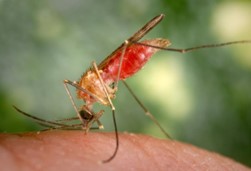In this blog post, AI is discussing fighting mosquito-transmitted diseases by mosquito genome modification.

Mosquitoes are one of the deadliest creatures on the planet, not because they are lethal themselves, but because they transmit many viruses and parasites that cause diseases such as malaria, dengue, Zika and chikungunya. These diseases affect millions of people globally and cause hundreds of thousands of deaths every year. They cause enormous health, social and economic burdens. In the absence of effective vaccines or treatments for some of these diseases, vector control strategies are essential to reduce the transmission and burden of mosquito-borne diseases. Mosquito genome modification has emerged as an innovative and promising vector control strategy.
Mosquito genome modification trials
One example of genetically modified (GM) mosquitoes is the Friendly™ mosquito, developed by Oxitec, a British biotechnology company that spun out of research at Oxford University. This mosquito is a strain of Aedes aegypti, the main vector of dengue, Zika and chikungunya. Oxitec’s mosquitoes carry a self-limiting gene that causes female offspring to die before they reach sexual maturity. Genetically modified male mosquitoes are released into the wild, where they mate with wild females and pass on the lethal gene to their progeny. This lethal gene is supposed to prevent the offspring from surviving to adulthood, thus reducing the number of mosquitoes that can bite humans and spread diseases. Oxitec has conducted field trials of its GM mosquitoes in the Cayman Islands, Brazil, Malaysia, and Burkina Faso. The trials have shown that the mosquitoes can effectively reduce mosquito populations and suppress the transmission of diseases such as dengue fever and Zika virus.
Researchers at Imperial College London have developed GM Anopheles gambiae mosquitoes that are resistant to malaria parasites. The researchers, using gene drive technology, have inserted genes into the mosquitoes that make them resistant to the parasites. The researchers are currently conducting field trials of their GM mosquitoes in Burkina Faso.
The World Mosquito Program is a research initiative that is developing and testing GM mosquitoes to fight mosquito-borne diseases. The program is working with researchers in Australia, Brazil, Indonesia, Colombia, and Vietnam. The program is developing two types of GM mosquitoes: one that is designed to reduce mosquito populations and one that is designed to make mosquitoes resistant to malaria parasites. The program has conducted field trials of its GM mosquitoes in Australia and Brazil. The trials have shown that the mosquitoes can effectively reduce mosquito populations and suppress the transmission of diseases such as dengue fever and chikungunya.
In addition to these trials, there are a number of other field trials of GM mosquitoes planned or underway in other countries.
Challenges of mosquito genome modification
It is important to note that the development and use of GM mosquitoes is a controversial topic. Some people are concerned about the potential risks of releasing GM mosquitoes into the environment. However, others believe that GM mosquitoes could be a valuable tool for fighting mosquito-borne diseases.
The World Health Organization (WHO) recognizes that GM mosquitoes could be a valuable new tool to fight malaria and other vector-borne diseases, but also cautions that they raise concerns and questions around ethics, safety, governance, affordability and cost-effectiveness. The WHO has issued new guidance for research and development on GM mosquitoes. The guidance framework describes best practices to ensure that the testing of GM mosquitoes as public health tools is safe, ethical and rigorous. The guidance framework describes best practices to inform decision-making about if and how these technologies are used. The guidelines recommend that field trials of GM mosquitoes be conducted in a responsible manner, with the full participation of local communities. The WHO also recommends that GM mosquitoes be carefully monitored to assess their impact on the environment and human health.
Conclusion
In conclusion, mosquito genome modification is a promising technology that could complement existing vector control interventions and help fight mosquito-borne diseases. However, more research and evaluation are needed to address the scientific uncertainties and ethical issues surrounding this technology. The WHO guidance framework provides a valuable reference for researchers, regulators and policy-makers who are involved in developing and testing GM mosquitoes as public health tools.
See also:
WHO takes a position on genetically modified mosquitoes
Genetically Modified Mosquitoes Fighting Malaria – Bioinformatics Hub
Mosquito Gene Alteration to Combat Disease – Bioinformatics Hub